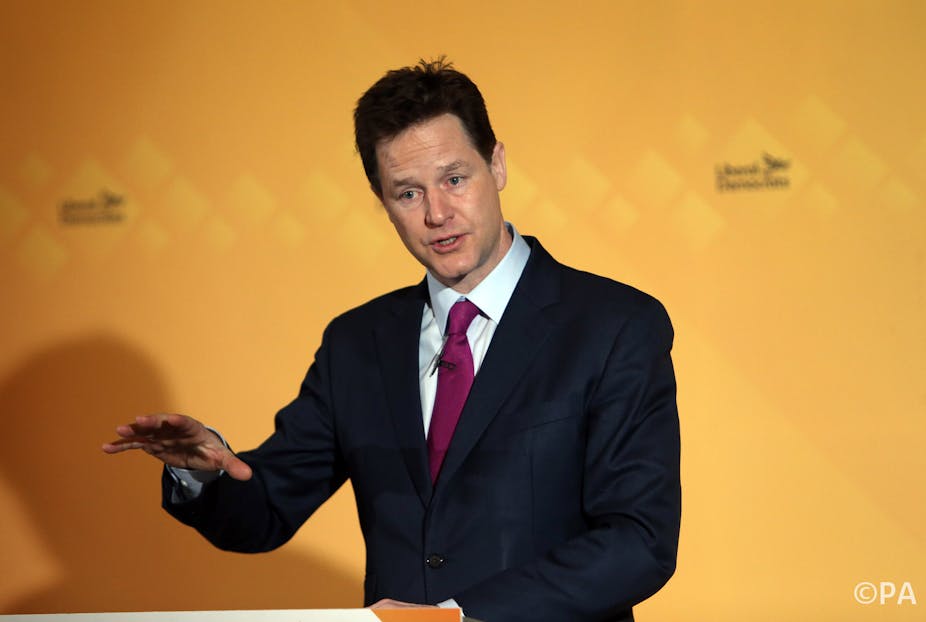The Liberal Democrats opened their election campaign with a pledge to revolutionise mental health services for adults and children.
The plan is to pump in £2bn extra into mental health over the next parliament. This is in on top of the £1.5bn that the coalition government has already agreed to add to the pot. Launching the ambitiously named Manifesto for the Mind, Nick Clegg said “equality for people with mental health issues is a liberal mission”.
It’s a powerful message and a tempting offer. But ultimately it lacks depth. More money for mental care means little unless the next government is willing to think hard about how to change the system. That’s on top of needing to reverse the damage that has already been done by the current government.
Talking the talk
Clegg has long expressed a particular interest in mental health policy. He spoke with enthusiasm and commitment on the subject long before he became deputy prime minister.
That makes his own coalition government’s performance on mental health seem all the more dismal. The rhetoric has certainly been strong; on Clegg’s watch there has been talk of putting mental health on an equal footing with physical health and the issue has frequently been highlighted by Clegg and other ministers.
But beyond rhetoric, what we have actually seen are mental health services slipping into crisis and chaos. It is not just that fewer mental health service users are getting support – those that do are getting less and less.
Funding problems have been greatly compounded by so-called welfare reform policies which have particularly hurt mental health service users. The system used to decide if people should receive benefits particularly disadvantages them. Housing benefit caps and the bedroom tax have also forced people to move home and abandon long established circles of support, caring family and friends and existing networks of professional help.
Norman Lamb, the Liberal Democrat minister with responsibility for this area, has been as good as Clegg at making positive noises but carries less and less credibility with service users and carers.

In Norfolk – his own constituency – campaigners say the local mental health trust has seen its spending cut by 8% since 2010. Lamb repeatedly talks of unacceptable standards of service, but seems incapable of doing anything about them from within the coalition government.
What’s missing
All this makes it difficult to see why voters should listen to what Clegg is now promising. They’ve seen how little he has achieved for mental health in one coalition so even if he gets the chance to form another, they might well wonder what these campaign promises might add up to.
The offer of “increased access to evidence-based talking therapy” on offer in the Lib Dem mental health package is likely to mean going on short courses of over-mechanical cognitive behavior therapy.
And the gains to be made by spending more on anti-stigma campaigns will have to redress the effects of government policies that have heavily stigmatised mental health service users as welfare claimants.
There is nothing in this plan about moving away from a recovery based model of care that is preoccupied with getting mental health service users off benefits and into work, whatever the personal cost, however unsuitable the jobs available.
Nor is there is a serious plan for curing the mental health system’s over-reliance on prescribing drugs. No measures are identified to reverse the growing numbers of service users undergoing compulsory “treatment”.
There is also no reassurance that the Liberal Democrats would seek to reverse the privatisation and outsourcing that has transformed the mental health system over the past five years. Without that, there will surely be more privileging of large companies like Serco and Virgin, whether they have experience as service providers or not, just because they are good at getting contracts.
How to walk the walk
The promise of more investment, based on essentially the same old treatment model is unlikely to be helpful for future mental health. What’s needed are not pre-election financial sweeteners, but thought-through proposals for culture change in Britain’s antiquated and inadequate drug dominated mental health system.
Clegg and his party don’t even have far to look for something better. The National Survivor User Network has set out a manifesto on mental health based on what it’s members have said should be priorities, and the Social Work Action Network has put forward a comprehensive programme for moving away from a medicalised model to a social approach to mental health.
Significant damage has been done to the mental health system over the past five years and an arduous task lies ahead for any political party – even one that puts this issue at the top of its campaign agenda. This time, though, ignorance will not be sufficient excuse for Clegg and his party.

